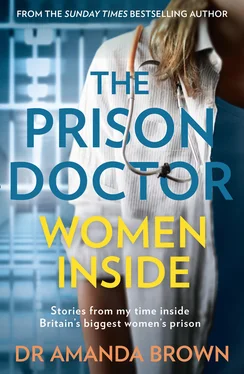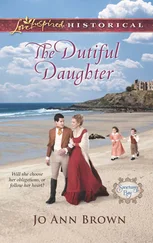‘I hope so,’ she said, smiling and softly stroking Dylan’s little hands. ‘I just want to move on from my old life. The MBU feels really safe and I’m learning loads. The health visitors are teaching me and the others different things – how to cook, sterilise bottles, and how to get the best out of my playtime with him as he gets older.
‘It’s great being with the other girls. We’re all going through similar stuff, so we understand each other. You should see lunchtimes when we all sit together with the babies. The bigger ones make such as mess – it’s absolute carnage!’
I laughed. ‘Yes, babies don’t often follow the rulebook.’
Megan smiled.
Megan had been given a three-year sentence, but would most likely serve eighteen months in custody and the rest on licence – meaning she would spend the remainder of her sentence on the outside, but would need to stick to certain conditions, including keeping in touch with supervising officers, not committing any offences, and residing permanently at one address. This meant that unlike some mothers, hopefully, she wouldn’t be split up from her baby. If women come into prison with babies under 18 months old, they can apply for a place on the MBU, and if they get a place, they have all the normal responsibilities of parenting, from changing nappies, to bath-time, playtime and everything in between. Apart from when their babies are in the nursery, the mums are encouraged to be fully responsible for the welfare of their children.
‘It never ends,’ she told me. ‘No telly time for me.’
The mothers are also given the opportunity to shop for their babies’ things using a combination of their own funds and child support money. This helps them with issues like budgeting, so that when they return home, buying nappies, formula and other items for their babies would not feel unfamiliar. When Dylan was old enough, Megan would be able to wean him herself, using food she had bought and cooked for him.
‘Some of the other mums shop from Asda for their babies. Those Organix toddler biscuits taste so good! They’re better than the food they serve us,’ Megan chuckled.
The unit also offered a therapeutic environment and sessions around parenting, as well as practical help. The very regime of prison – the rules, the regularity of food being provided, no drugs, no domestic violence – promotes bonding with children and is ideal for young women like Megan, who need the support.
‘The team are so helpful and always have time for us,’ she told me. ‘I know some of the other residents think we have it easy on the MBU, but we don’t. It’s a tough graft!’
‘It is,’ I smiled. ‘Being a mum is very hard work!’
I prescribed a course of antibiotics and painkillers on the computer for Megan, so that she could start them straight away, and told her to come back and see me if her symptoms persisted.
‘I will,’ she said. ‘Thank you for seeing me.’
‘You’re welcome. It was really good to see you again,’ I said, and with that she wheeled her buggy and baby out of my little room and off down the corridor.
As I watched her go, a memory flashed into my head of the day I had to go back to work when my first son, Rob, was three months old. Apart from all the usual hormonal and emotional fluctuations of the postnatal rollercoaster ride, I was also struggling to imagine a future for my beloved little boy.
When I was thirty-four weeks pregnant, I was referred for a scan to check the placental flow as my bump was measuring smaller than it should’ve done at that stage of the pregnancy. I wasn’t nervous going to the scan, and I thought it was routine, so I drove there myself. I had seen enough pregnant women to know that the size of the bump often did not reflect the size of the baby. I didn’t for a moment imagine there would be anything wrong.
The consultant I was referred to in Oxford was very quiet and seemed to spend an eternity scanning me until he finally announced: ‘I can’t find his right leg.’
As he said that, my head started spinning and even though I was lying down, I felt as if I was going to pass out.
‘What do you mean?’ I asked in disbelief, wanting him to say he had made a mistake, that it wasn’t true.
He continued in an unemotional way to give me a medical list of other possible problems that Rob may have; complicated syndromes that I had never heard of, that could be associated with a limb not developing.
‘But we won’t know what else may be wrong with him until he is born,’ the consultant said.
As he carried on talking, I became more and more terrified until I convinced myself that my poor little baby was going to face a life of unimaginable difficulties.
I felt as if I couldn’t breathe. I don’t know how I made it home.
Over the next ten days, my fears spiralled out of control as I imagined all sorts of dreadful scenarios. I couldn’t imagine the future and felt like I was living in a nightmare I couldn’t wake up from.
I struggled to eat and sleep and even just to think straight in the end.
I lost a stone in weight in that time, and when I felt that I just couldn’t cope any longer the decision was made for me to have a caesarean section when I was thirty-six weeks, as there was a growing concern for both my sanity and Rob’s welfare.
I hoped and prayed with all my heart that it would only be his leg that was missing, and that all the fears and dark imaginings that had formed and grown in my mind would not prove to be a reality.
Holding him in my arms and looking into his tiny face for the first time, my love for him was immediately overwhelming, overpowering and beautiful. My fears of multiple problems were unfounded, to my massive relief. But despite my incredible love for him, I thought I could never truly be happy again. He was born with a very short bent right tibia, no fibula, and he only had three little toes on his right foot. It was obvious that he would have to undergo major surgery to enable him to walk, and would forever be dependent on a prosthetic leg.
It is impossible to know, when our children are babies, what the future will hold for them. I shed so many tears in those first few weeks, that I began to wonder if I would ever get through a day without crying. Little did I know then that he would turn out to be one of the happiest and most positive people I have ever met. He loves life with a passion, and after leaving school travelled all over the world with a spare leg in his rucksack. While on his travels he skydived and did the biggest bungee jump in the world with his one leg strapped for safety.
I still remember the dreadful thought of leaving him, and of how nervous I felt about going back to work. I had convinced myself that I had forgotten all the medicine I ever knew, and felt I had lost every tiny grain of confidence I ever possessed, especially as I’d never had much to start with. I felt the same dread of separation and loss of confidence just before going back to work when my beloved second son Charlie was three months old. It was no easier second time around. Even though it was over thirty years ago, the memory was still so clear and vivid.

By definition, the fact Bronzefield is a prison for women means it is full of mothers and the human female chains that form our society. Around two-thirds of women in prison have dependent children under the age of 18 at home. There are mothers whose kids have been taken away from them; mothers whose kids are temporarily being looked after by others; new mothers looking after their babies on the MBU; and, sometimes, mothers who have harmed their children.
In many cells are photos of kids – baby photos, school photos, holiday pics – little gummy faces staring down from the confined walls. Alongside these are scrappy bits of paper with drawings of rainbows, cars, princesses, footballs and everything in between; a complete range of children’s wonderful creations and imaginings to cheer up their rooms and make them feel a bit more homely.
Читать дальше













